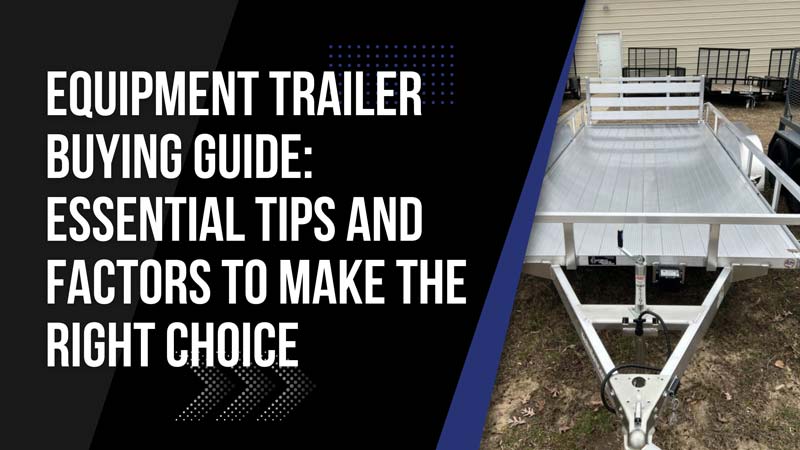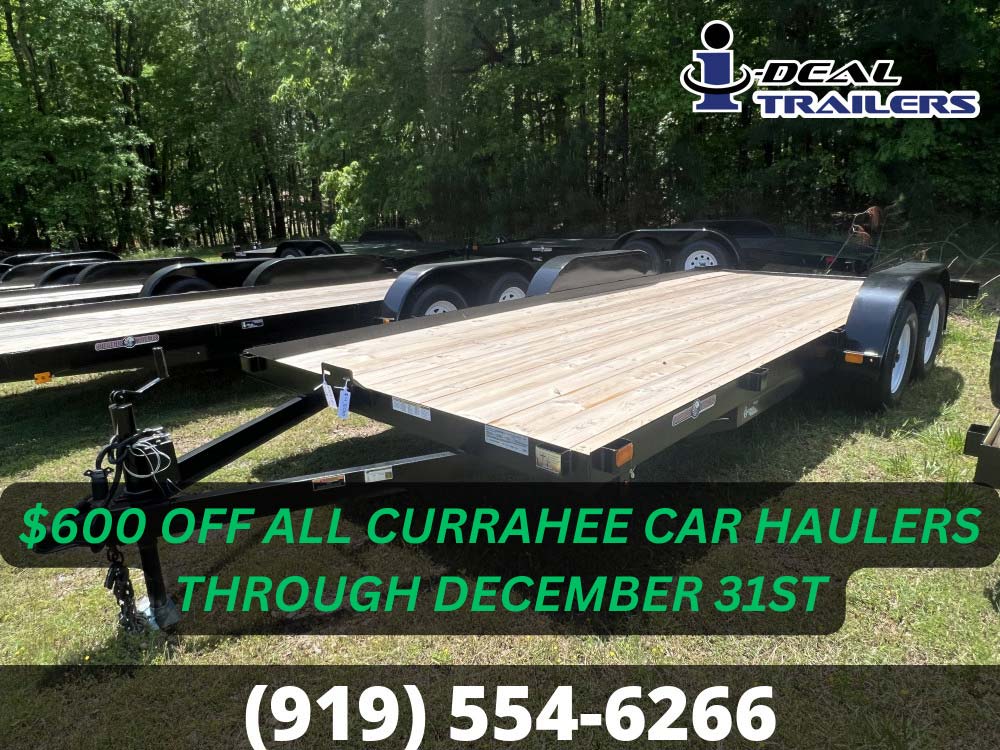Equipment Trailer Buying Guide: Essential Tips and Factors to Make the Right Choice

Equipment trailers are specifically designed for transporting heavy machinery, such as construction and agricultural equipment, as well as vehicles like ATVs, UTVs, and cars. These trailers come in various configurations, with features like adjustable ramps, tilt decks, and weight capacities to accommodate different types of machines and vehicles. A well-suited equipment trailer not only ensures the safe and secure transport of your cargo but also facilitates loading and unloading, saving you valuable time and effort on the job site.
As you embark on your search for the ideal equipment trailer, it's essential to arm yourself with knowledge about the various types, available features, and factors to consider. Doing so will allow you to make an informed decision, ensuring that you invest in the right equipment trailer that will efficiently and effectively serve your hauling requirements for years to come.
In the sections that follow, we will explore the essential tips and factors to keep in mind when evaluating equipment trailers, discuss the benefits, and explain key characteristics that make them suited for particular tasks. By the end of this guide, you'll be well-versed in how to select the perfect equipment trailer to enhance your hauling capabilities, no matter the type of machinery or project at hand.
Types of Equipment Trailers and Their Applications
1. Flatbed Trailers
Flatbed trailers are designed with a single, level platform and no sides or roof, providing a versatile option for transporting various types of equipment. From construction machinery to farm equipment, flatbed trailers can accommodate a wide array of cargo that might not fit on other trailer types due to their size or shape.
2. Gooseneck Trailers
Gooseneck trailers offer a more robust and stable towing solution for heavy-duty hauling tasks. Their design includes a gooseneck hitch that connects to the tow vehicle's bed, providing increased weight capacity, improved maneuverability, and a tighter turning radius. These attributes make the gooseneck trailer an excellent choice for transporting large or unusually heavy equipment.
3. Tilt-deck Trailers
Featuring a hydraulic or mechanically tilting deck, these trailers simplify the loading and unloading process for equipment without ramps. Tilt-deck trailers are particularly useful for transporting low-clearance machines, such as forklifts or scissor lifts, as the angled approach reduces the risk of damage.
4. Drop-deck Trailers
With a lowered deck situated between the wheels, drop-deck trailers allow for easier loading of taller equipment, such as excavators or cranes. The lower deck height provides increased clearance, making these trailers an ideal choice for taller machinery transport.
Key Factors to Consider When Choosing an Equipment Trailer
- Payload Capacity: Perhaps the most critical factor to consider is the trailer's payload capacity, which should be sufficient to accommodate the combined weight of your cargo and any additional equipment required for loading and unloading. Ensure to verify your tow vehicle's towing capacity and the trailer's gross vehicle weight rating (GVWR) before making a purchase.
- Trailer Dimensions: Choose a trailer with deck dimensions that can comfortably fit your equipment, providing adequate space for securement and any necessary accessories. Consider not only your current hauling requirements but also potential changes in your equipment inventory, as a more spacious trailer can accommodate future growth.
- Loading and Unloading Capabilities: Consider how you will load and unload your equipment onto the trailer and whether any specialized features, such as tilt decks, built-in ramps, or winches, are necessary to facilitate this process. Also, consider the type of ground on which you'll be loading and unloading, as uneven or rough terrain may require additional support systems or techniques.
- Build Quality and Craftsmanship: Invest in a trailer constructed with high-quality materials and reliable craftsmanship to ensure longevity and durability. Look for features such as powder-coated steel frames, reinforced axles, and heavy-duty tires, as these can contribute to a more robust and hardwearing trailer suited to the demands of equipment hauling.
- Customization Options and Accessories: Explore available customization options and accessories for equipment trailers, which can help tailor your trailer to your specific needs. These may include adjustable tie-down points, toolboxes, spare tire carriers, or even removable sides or ramps.
Additional Tips for Your Equipment Trailer Purchase
- Research Reputable Manufacturers and Dealers: Choose a reputable manufacturer and dealer with a proven track record of producing high-quality equipment trailers. Investigate online reviews and solicit recommendations from industry professionals to find reliable and trustworthy options.
- Inspect the Trailer Before Purchasing: Before finalizing your purchase, conduct a thorough inspection of the equipment trailer. Look for any signs of wear, damage, or manufacturing defects, and check that all features function correctly. Where possible, opt for a test drive to evaluate the trailer's performance under real-world conditions.
- Consider Your Budget and Financing Options: Establish a budget for your equipment trailer purchase, considering both the initial investment and the long-term cost of ownership (such as maintenance, repairs, and registration fees). Be sure to balance cost with quality and remember that financing options may be available at your chosen dealership.
Conclusion
Choosing the right heavy-duty equipment trailer requires careful consideration of various factors, including payload capacity, dimensions, loading capabilities, build quality, and available customization options. By conducting thorough research, seeking expert advice, and arming yourself with the knowledge from this comprehensive guide, you can confidently invest in an equipment trailer that will efficiently and effectively meet your hauling needs for years to come.
At I-Deal Trailers, our expert team is here to help you navigate the equipment trailer market and guide you toward the perfect solution for your hauling requirements. Please don't hesitate to contact us for any assistance or information necessary to make an informed decision. Our goal is to help you enjoy a stress-free and efficient transport experience with every haul.
About Us
Are you looking for a reliable company to buy a trailer for your next project? Look no further than I-Deal Trailers. We are a family-owned and managed business based in Wake Forest, NC. And we have everything you need in terms of trailers, whether it is a utility trailer, a dump trailer, or even a gooseneck trailer. We’ve got you covered.We also help provide financing options to our clients. You can reach us at (919) 554-6266 or fill out our contact form to learn more.

